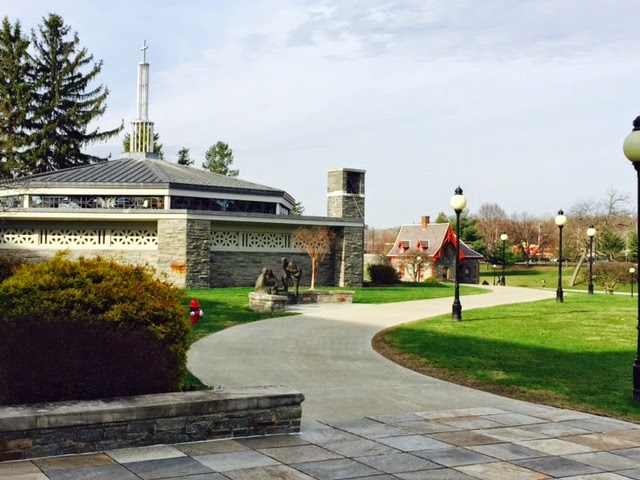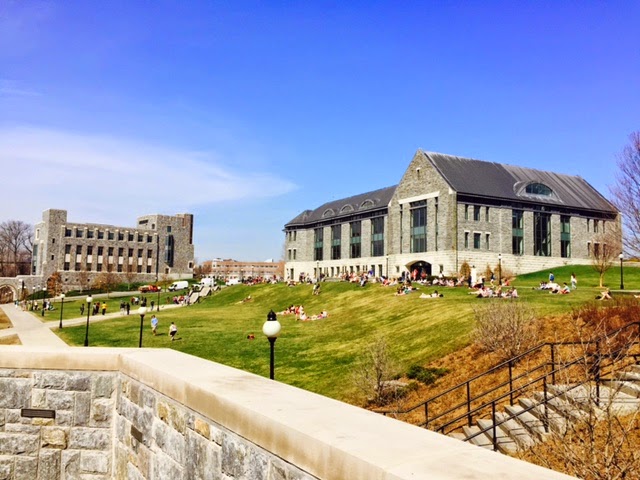At the end of January, I was lucky enough to attend a counselor-fly-in to the University of Miami in Coral Gables, Florida for three days. I have never visited this school and I was impressed with the high level of academics and the beautiful community of students, faculty, and surrounding environment that makes up 'The U". Miami is a research university and has just over 11,000 undergraduates, which makes it a very accessible campus, and allows for students to get to know their faculty and administration and establish relationships to help with their academics and career search. As you can see by the pictures below, the University of Miami is situated on an absolutely beautiful campus surrounding a small lake with water fountains in the middle. Right next to the lake is an outdoor swimming pool with Olympic style diving boards. The University is about 25 minutes outside of Miami, and is in the suburbs of Coral Gables, which is an absolutely pristine town.
Academically, the university has pretty much any type of major students are looking for, including architecture, marine biology, engineering, and business. Miami is a school that continues to grow in popularity, and is a school that's academics, culture, and environment, makes it a place where many students should look. For everyone who has had enough with this year's winter, when I was down there, it was a bit chilly to the locals at about 72 degrees every day! Check out some facts about the school below, and you would be smart to put this school on your map!
Miami's Mascot is the Ibis, which is a type of bird, known to be the last to leave before a storm hits and the first to come back when the storm is over, so just like their students and faculty, the Ibis is known for its resiliency.
There are 11 schools and colleges, including the Miller School of Medicine and the School of Law. The other nine undergraduate colleges are:
For admissions, they offer Early Decision, Early Action, and Regular Decision, with an RD deadline of January 1st. This past year, UMiami had about 700 students apply through ED, and they accepted about 180 students, they had about 15,000 applications through EA and accepted about 6,500 students, and through regular decision they had about 17,000 applications, and most likely will accept about 5-6 thousand students. Their middle 50% for the SAT for acceptance is 1900-2100 and the ACT is 28-32. They offer a ton of big time merit scholarships including the Stamps Foundation Scholarship which is a full ride (applicants usually have a 1500 SAT or 35 ACT) and they offer 70 full tuition scholarships each year.
UMiami has a fantastic career development center, called the Toppel Career Center. This is a 12,000 square feet building dedicated to career counseling, which is a big deal on their campus. Here they offer 1-on-1 career advising and interview labs which are focused on the student's industry they are going for, and they have cameras and microphones to record practice interviews. The career center also offers "meet-ups" with employers for their students to network. Finally, UMiami gives 1 free academic credit for an internship. Check out www.hireacane.com for more information.
Othere highlights:
Architecture has 3 semesters focused on the art and drawing aspects of this field, they are very big on urban design and living, and students complete one semester studying in Rome.
College of Engineering offers a 6-year BS/MS Program Partnership with the University of Bologna in Italy (which is a top 10 school for civil engineering in world). This is for civil engineers only, where they do 3 1/2 years in Miami and 3 1/2 years in Italy. Students graduate with BS and MS from UMiami and a MS from U of Bologna.
The Nursing program usually has about 25-35 students per class and students do not have to apply directly to the program. If they are accepted to the University, they can be a nursing major if they want.
The Frost School of Music has about 450 undergraduates, and all students must audition.
They also offer a music engineering major, where students get a BS in music, and take lots of math and engineering courses. Other unique majors include music therapy, music education, and music business. Although it is not mandatory, it helps to audition on campus, as this could help with potential scholarships.
The School of Communication offers five main areas including Interactive media, journalism, advertising, PR, and motion pictures. LinkedIn has named UMiami the #17 school in the country for media preparation.
Hopefully this information was helpful, and I urge you all to look more closely into The University of Miami as a potential destination! Enjoy the pictures, and as always, happy searching!
-Joseph D. Korfmacher, MA









